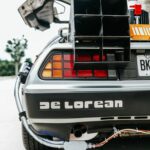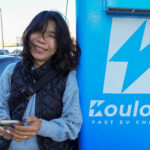April 6, 2022
.

Considerations as the US Tackles EV Charger Supply
The success or failure of our nation’s mandate for EV adoption cannot be measured in EV cars purchased, EV chargers deployed, or even modeled avoidance of greenhouse gas emissions. Since the industrial revolution, the metric for success or failure in unproven microeconomies has always been customer demand. Customer demand and intended purchasing behavior is the most sustainable driving force behind any technological transition. Strong customer demand cannot only withstand manufacturing delays; if made attractive enough, it can, in fact, be fueled by it.
The US is contending with EV manufacturing delays, supply chain bottlenecks, and a charging network that is lacking in both quality and quantity. Koulomb is focused on addressing EV charging with scalable solutions that maximize EV utilization, uptime, and consumer confidence to sustain customer demand.
With respect to EV charging adoption in particular, some considerations that fuel our vision:
EV owners who own homes do 80% of their charging at home. They expect their home charge to be slow and are comfortable with the idle vehicle. EV owners’ expectations when they leave their home are very different. They want fast charges.
Level 2 charging solutions will only charge 2-3 cars per day. Utility attracts private capital, and while Level 2 utility is high, customer service levels from these slower chargers are not adequate to sustain the demand inherent in EV growth forecasts.
Level 3 charging stations require long-term maintenance and care, by professionals who care about maximum uptime.
Level 3 charging stations are expensive and require a full commitment, at a site level, to ensure long-term operability.
The “Gas Station” Model
Koulomb was created because its founders own EVs, have experienced Range Anxiety, and as electrical and renewables contractors, believe that an important part of EV infrastructure expansion is the privately-owned charging provider.
The US auto industry has historically benefited and grown thanks to an organic support system via a privately-owned “gas station” model, whereby economic participants are incentivized to provide reliable gas power distribution to internal combustion engine vehicles. If you have ever owned a gas-powered vehicle, you have come to expect the following:
You expect you can drive distances far and near and locate a gas station.
And upon your arrival:
You expect to be charged a reasonable, market rate for the gas
You expect all the gas station equipment to be working
You expect the station to feature the latest technology
You expect to complete your purchase transaction in 10 minutes or less
This reliability is achieved, in part, because of the following:
Gas station owners are incentivized to place their stations in the maximally optimal locations
Gas stations are earning ongoing revenue and compete for driver traffic, which helps it justify continuous re-investment in technology, customer service, and maintenance
A modern gas station experience is such that it can service hundreds of customers in a single day
Koulomb’s vision is not novel. We are looking to solve an environment problem with economic lessons taken from a gas station model that has evolved over ~115 years.
Convenient locations
Earn ongoing revenue in order to deploy subsequent re-investment in technology, customer experience, and maintenance
A charging speed that allows for Koulomb to serve hundreds of customers a day
Koulomb’s Part in EV Infrastructure Expansion
Koulomb is investing time, resources, and capital in EV charging infrastructure alongside its partners in federal, state, and local government.
Designated Alternative Fuel Corridors
Koulomb focuses on relieving the unplanned Range Anxiety for EV drivers who are traveling but do not have the battery life to reach their destination. Koulomb purchases land and partners with property owners along important travel corridors to ensure it can provide solutions to drivers where they need it most.
Publicly Accessible Locations
EV drivers don’t need to be on long-distance travel to experience Range Anxiety. Plans change, emergencies occur, and frankly, drivers can forget to charge. Koulomb partners with property owners in high traffic locations to place its chargers. In this scenario, Koulomb provides a turnkey charging solution to property owners where they can host chargers, earn revenue, and avoid the headaches of installing and maintaining the chargers. Charging stations are accessible by any EV drivers at any time of the day.
Universal Compatibility
Koulomb’s hardware is compatible with all EV manufacturers and models on the market today offering CCS and CHAdeMO connectors, the latter of which enables a Tesla charge with a Tesla connector. Koulomb charging locations also comply with the American with Disabilities Act (“ADA”). Koulomb’s hardware has interoperability with market-standard software solutions.
Long-term Operation and Maintenance
Koulomb’s model of install + ownership of the chargers is key to avoiding stranded assets across the EV charging landscape. Providing a premium experience to EV drivers, and charging for it, ensures that the long-term goals of drivers, the network, and Koulomb are intrinsically-linked.
Partnership with local DOT, states, and highway authorities
With the passage of the Bipartisan Infrastructure Law (“BIL”), Koulomb plans to engage various DOTs and state and local government officials to best deploy its EV charging assets. We are excited that our governing bodies expect the help of private investment to help the US on this important journey.
Sources:
326 views
Recent Posts


313


233


314